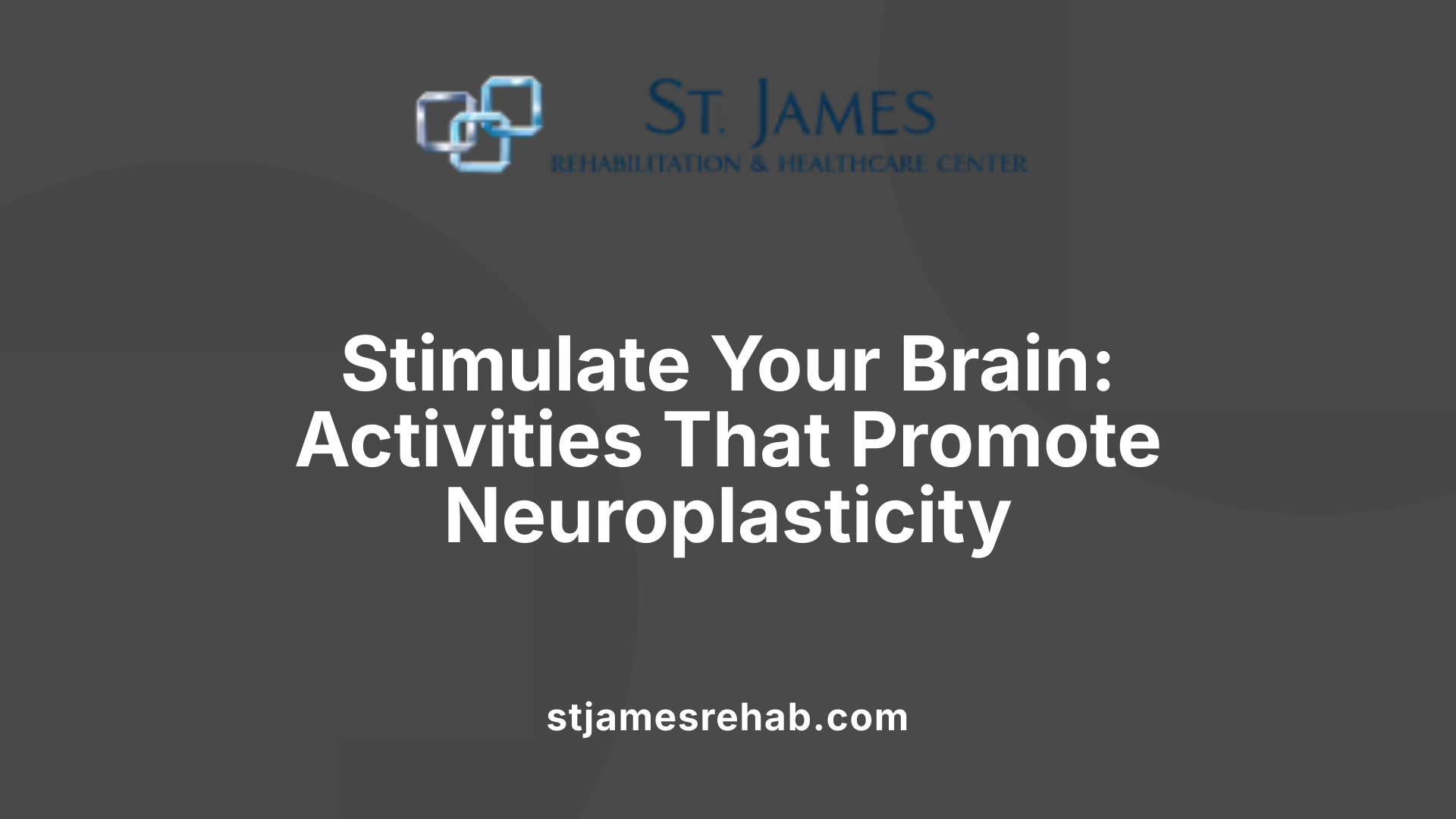The Benefits of Recreational Therapy for Cognitive Health
Enhancing Mind and Spirit Through Therapeutic Recreation

Unlocking Cognitive Potential with Recreational Therapy
Recreational therapy offers a comprehensive approach to supporting cognitive health and mental well-being by integrating enjoyable, activity-based interventions that engage the mind, body, and emotions. This holistic modality utilizes arts, crafts, music, dance, and social activities to stimulate various brain functions, foster emotional resilience, and improve overall quality of life, especially for vulnerable populations such as seniors and individuals recovering from injury or illness.
Core Principles and Methods in Recreational Therapy
 Recreational therapy, also known as therapeutic recreation, emphasizes a personalized and evidence-based approach to enhance an individual's overall well-being through leisure activities. It is grounded in fundamental principles that focus on assessing each person's unique needs, strengths, and goals.
Recreational therapy, also known as therapeutic recreation, emphasizes a personalized and evidence-based approach to enhance an individual's overall well-being through leisure activities. It is grounded in fundamental principles that focus on assessing each person's unique needs, strengths, and goals.
The first step involves a comprehensive assessment of the individual, considering physical health, emotional well-being, social skills, cognitive abilities, and spiritual needs. This assessment guides the development of tailored activity plans that are both engaging and meaningful.
Once a plan is in place, certified therapeutic recreation specialists (CTRS) implement a variety of leisure activities. These can include arts and crafts, music, dance, sports, community outings, gardening, and sensory exploration. Activities are designed to stimulate physical, cognitive, emotional, and social functions, often from a multidisciplinary perspective.
Throughout the intervention process, ongoing evaluation is crucial. Therapists monitor progress, adjust activities as needed, and document outcomes to ensure therapeutic goals are met. This dynamic approach supports continuous improvement and maximizes benefits.
Recreational therapy utilizes several methodologies such as behavioral activation to boost mood, cognitive stimulation to enhance mental acuity, stress management techniques, and principles of positive psychology. These strategies collectively promote motivation, social interaction, and emotional resilience.
The methods used in recreational therapy aim to restore or improve physical mobility, mental health, social skills, and emotional regulation. They are especially beneficial for individuals recovering from injuries, managing chronic conditions, or experiencing mental health challenges.
In summary, the core in recreational therapy revolves around assessing individual needs, creating personalized activity plans, engaging clients in meaningful leisure pursuits, and evaluating progress to foster independence, recovery, and a higher quality of life.
Neuroplasticity and Cognitive Enhancement through Activities

What are the benefits of recreational therapy for improving cognitive functions such as memory, attention, and problem-solving?
Recreational therapy plays a significant role in enhancing cognitive abilities like memory, focus, and problem-solving skills. It involves activities such as arts and crafts, sports, music, and community outings that actively engage the brain.
These activities provide mental stimulation, exercising different brain regions and fostering neural connections. For example, puzzles and games stimulate problem-solving and attention, while arts and music launch creative thinking and emotional expression.
Engaging in new and challenging activities encourages the brain to forge new neural pathways. This process, known as neuroplasticity, is crucial for recovering and maintaining cognitive functions, especially in individuals with brain injuries or dementia.
Furthermore, combining physical activities with cognitive tasks—such as rhythm exercises or coordination activities—benefits brain health by promoting neural integration across motor and cognitive networks.
Social interactions during group activities help reinforce learning, improve communication skills, and stimulate mental processes. These interactions not only enhance social well-being but also encourage cognitive engagement.
Overall, recreational therapy offers a comprehensive approach by supporting mental, emotional, and social health, all of which are integral to cognitive improvements. It helps reduce symptoms of cognitive decline, boosts confidence, and fosters a sense of accomplishment, making it a valuable component of holistic healthcare.
| Activity Type | Cognitive Benefits | Additional Notes |
|---|---|---|
| Brain-stimulating games | Memory, attention, problem-solving | Includes puzzles, board games |
| Arts, crafts, music, dance | Creativity, lateral thinking, emotional health | Enhances problem-solving and emotional expression |
| Nature walks | Focus, sensory processing | Combines physical activity with mental engagement |
| Physical + cognitive tasks | Brain integration, neuroplasticity | Rhythms, coordination exercises aid brain health |
In sum, recreational therapy nurtures cognitive resilience by offering diverse activities that strengthen the mind through engagement, challenge, and social connection.
Supporting Cognitive Recovery and Rehabilitation

How does recreational therapy aid in cognitive recovery after injury or illness?
Recreational therapy plays a vital role in helping individuals regain cognitive functions following injury or illness. It involves engaging patients in activities that stimulate different parts of the brain, fostering neural connections essential for mental recovery. Activities such as puzzles, memory exercises, problem-solving games, and creative arts challenge the brain, encouraging neuroplasticity—the brain's ability to rewire itself.
Personalized interventions are tailored to each person's specific needs, interests, and recovery goals. These programs often include arts and crafts, music therapy, outdoor activities, and adaptive sports that boost motivation, improve attention, and enhance processing speed.
In addition to traditional activities, innovative approaches like virtual reality and assistive devices are increasingly used to create immersive and engaging cognitive training experiences. Virtual reality environments can simulate real-world scenarios, helping patients practice daily tasks in a controlled, motivating setting.
Recreational therapy also emphasizes social interaction and emotional support, which are crucial for sustainable cognitive growth. Group activities and community engagement not only stimulate mental functions but also promote emotional well-being.
Ultimately, recreational therapy aims to restore cognitive skills and empower individuals to reintegrate into their communities. By addressing both mental and emotional needs, these interventions contribute to an improved quality of life after illness or injury.
Activities that Boost Mental and Emotional Wellness

How do group activities and social interactions support mental health?
Group activities and social interactions are crucial in enhancing cognitive health and emotional well-being. Participating in community outings, group games, or social gatherings provides a sense of belonging and helps combat feelings of loneliness and social isolation. These interactions stimulate brain function and foster emotional support, which is essential for psychological resilience and overall mental health.
What role do celebrations and community events play in mood enhancement?
Celebrations and community events, such as festivals, cultural outings, or parties, release endorphins—natural mood lifters. These joyful experiences not only elevate spirits but also promote social bonding and a sense of achievement. Engaging in festivities helps decrease stress and anxiety, contributing to improved emotional balance and cognitive clarity.
How can engaging in arts, music, cooking, gardening, and storytelling improve emotional well-being?
Creative outlets like arts, music, and storytelling stimulate brain regions linked to problem-solving, imagination, and emotional expression. Gardening and cooking also offer sensory-rich experiences that relax the mind and reduce emotional tension. These activities foster self-expression, boost confidence, and serve as therapeutic tools to manage depression and anxiety.
How does releasing endorphins through pleasurable activities influence mental health?
Activities that uplift mood by releasing endorphins—such as participating in celebrations, community events, or engaging hobbies—are associated with significant mental health benefits. Endorphin release reduces feelings of depression and anxiety while enhancing overall cognitive function. Regular involvement in such activities can improve mood stability, increase motivation, and promote a positive outlook on life.
| Activity Type | Emotional and Cognitive Benefits | Examples |
|---|---|---|
| Group activities and social interactions | Reduce loneliness, stimulate brain function, foster emotional support | Community outings, group games, social clubs |
| Mood-boosting celebrations and events | Elevate mood, decrease stress, promote social bonding | Festivals, parties, cultural celebrations |
| Creative and sensory activities | Enhance emotional expression, relaxation, and self-confidence | Arts and crafts, music, gardening, cooking |
| Endorphin-releasing activities | Improve mood, reduce anxiety and depression | Celebrations, dancing, engaging hobbies |
Overall, incorporating diverse recreational activities into daily routines offers substantial benefits for mental and emotional wellness. These experiences not only lift spirits but also strengthen social connections and support lifelong cognitive health.
Special Focus on Senior and Aging Populations

Why is recreational therapy especially beneficial for aging populations and seniors?
Recreational therapy offers numerous advantages for seniors by promoting holistic health through engaging activities tailored to their needs. Age-related physical and cognitive changes can impact mobility, strength, and reasoning skills. Therapeutic recreation specialists create personalized programs involving arts and crafts, social outings, music therapy, and gentle exercises.
Activities like arts and crafts and social outings encourage movement and mental stimulation, helping seniors maintain their physical and cognitive abilities. Music therapy and group activities foster emotional well-being and social connections, critical in reducing loneliness and depression common in older adults.
Engagement in recreational activities enhances confidence and emotional health by providing a sense of purpose. These activities also help alleviate stress and anxiety, promoting relaxation.
By focusing on strengthening mobility and reasoning, recreational therapy helps seniors preserve independence longer. Overall, it improves their quality of life, emotional resilience, and social integration, supporting healthier, more active aging.
How recreational therapy supports physical and mental health among seniors
Activities such as moderate exercises, dance, and outdoor recreation contribute to better mobility and strength. Creative therapies like art, music, and storytelling stimulate cognitive functions such as memory and reasoning. Social interactions through outings and group activities help build friendships and combat loneliness. Participation in enjoyable activities boosts mood and emotional stability, which can extend lifespan and improve overall life satisfaction.
Additional Insights for Senior Care
| Activity Type | Benefits | Focus Area |
|---|---|---|
| Arts and Crafts | Enhances fine motor skills and creativity | Physical and cognitive |
| Social Outings | Builds social connections and reduces loneliness | Emotional and social |
| Music Therapy | Improves mood and memory | Emotional and cognitive |
| Physical Exercises | Maintains mobility, strength, and balance | Physical |
| Sensory Activities | Stimulates senses and supports relaxation | Cognitive and emotional |
Recreational therapy tailored for seniors thus plays a vital role in fostering active, independent, and fulfilling lives in later years.
Embracing Recreation for Lifelong Cognitive Well-being
Recreational therapy represents a vital component of holistic healthcare, offering tailored activities that enhance cognitive function, emotional resilience, and physical health. Its integration into treatment plans not only aids in recovery from injuries and illnesses but also supports aging populations in maintaining independence and joy in daily life. With its evidence-based approach and emphasis on meaningful engagement, recreational therapy truly fosters a vibrant, resilient mind and spirit—nurturing overall wellness throughout life.
References
- How Recreational Therapy Boosts Your Cognitive Function
- How Therapeutic Recreation Supports Mental Health
- 5 Benefits of Recreational Therapy for Seniors
- The Benefits of Recreation Therapy in Inpatient ...
- Recreational therapy | EBSCO Research Starters
- Recreational Therapy in Wellness and Recovery
- Recreational Therapy: Definition, Benefits, Activities





